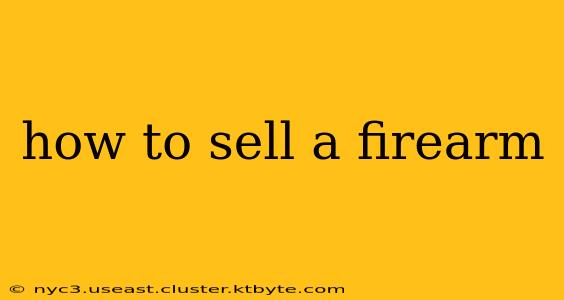Selling a firearm requires careful attention to both federal and state laws, as well as a commitment to responsible gun ownership. This comprehensive guide outlines the crucial steps involved in selling a firearm safely and legally, ensuring a smooth and compliant transaction for both the seller and the buyer.
Understanding Federal and State Regulations
Before you even list your firearm, it's crucial to understand the specific regulations in your state. Federal law requires licensed dealers to conduct background checks on all firearm purchasers, but state laws vary significantly regarding private party transfers. Some states require background checks for all firearm sales, while others may have exemptions for certain types of firearms or transactions.
Key Federal Regulations to Remember:
- Licensed Dealers: If you are a licensed firearms dealer (FFL), you must adhere to all Bureau of Alcohol, Tobacco, Firearms and Explosives (ATF) regulations, including conducting background checks through the National Instant Criminal Background Check System (NICS).
- Prohibited Persons: You cannot sell a firearm to anyone legally prohibited from owning one, including convicted felons, individuals with certain mental health conditions, or those subject to restraining orders. Ignorance of the buyer's legal status is not a defense.
- Record Keeping: Depending on your state and whether you’re a licensed dealer, you may be required to maintain records of firearm sales.
Research Your State's Specific Laws:
The most important step is to consult your state's attorney general's website or relevant state agencies to determine the precise legal requirements for selling firearms privately. Failing to comply with state and local laws can result in significant penalties.
Steps to Selling a Firearm Safely and Legally
-
Assess Your Firearm's Value: Research comparable firearms sold recently to determine a fair market price. Consider the firearm's condition, model, accessories, and any modifications. Online marketplaces and gun forums can provide valuable pricing information.
-
Thoroughly Inspect Your Firearm: Ensure the firearm is in good working order and clean. Document any existing damage or wear. This will help prevent disputes later.
-
Choose a Safe and Legal Selling Platform: Several options exist, each with its own advantages and disadvantages:
- Licensed Firearms Dealers: Selling through an FFL is the safest and most legal route, as they handle all background checks and paperwork. However, you'll typically receive less money for your firearm.
- Online Gun Forums and Marketplaces: These platforms can reach a wider audience but require careful vetting of potential buyers and strict adherence to platform rules and applicable laws. Always prioritize safety and legal compliance.
- Private Sales (with caution): If your state allows private sales without a background check, proceed with extreme caution. Verify the buyer's identity and legality to own a firearm rigorously.
-
Verify Buyer's Identity and Legality: Before proceeding with any sale, thoroughly verify the buyer's identity and legal right to own a firearm. Request identification and, if required by your state, conduct a background check or use a third-party service that facilitates this.
-
Complete the Transaction in a Safe Location: Never conduct a firearm transaction in a secluded or unsafe location. Choose a well-lit public place, or consider meeting at a local gun store that allows private sales.
-
Document the Transaction: Keep detailed records of the sale, including the buyer's name, address, date of sale, firearm description, and any other relevant information required by your state. Consider using a bill of sale.
Tips for a Smooth Transaction
- Clear Communication: Maintain clear and open communication with the buyer throughout the process. Address their questions promptly and professionally.
- Be Prepared: Have all necessary documentation, including proof of ownership and the firearm itself, ready at the time of the transaction.
- Be Patient: Finding the right buyer may take time. Don't rush the process, especially when it comes to safety and legal compliance.
Disclaimer: This guide provides general information and should not be considered legal advice. Always consult with a legal professional or your state's relevant authorities to ensure compliance with all applicable laws and regulations before selling a firearm. The safety and legality of firearm transactions are paramount. Incorrect handling of the sale process can result in criminal penalties and liability.

